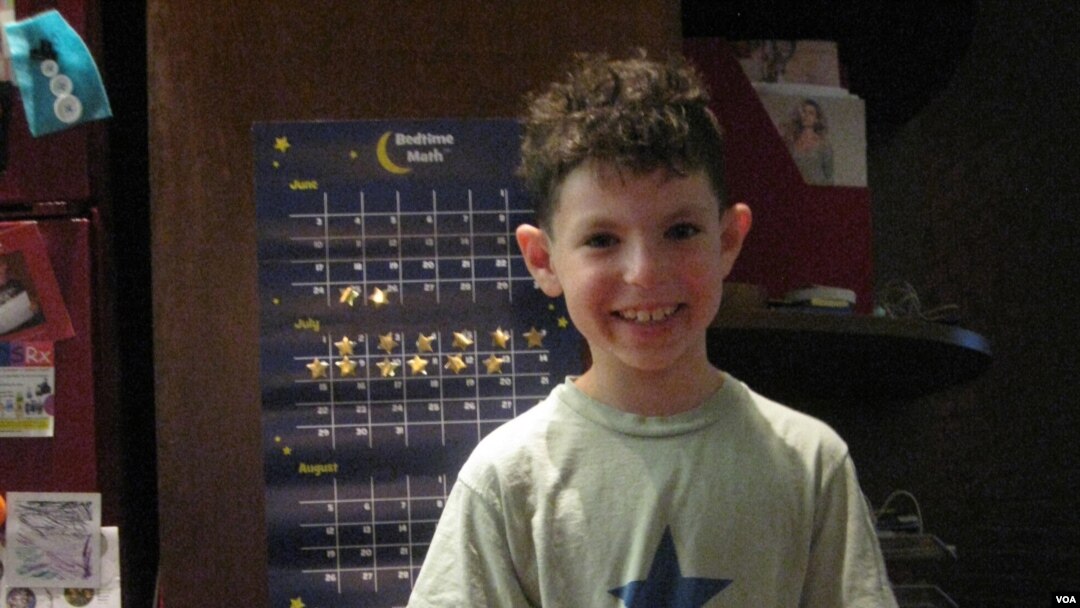NEW YORK — Ask a lot of people and they will tell you that math is not their strong suit. In an international student assessment program in 2009, the United States ranked 25th in math proficiency. One New Jersey parent wants to help change that, beginning with a new nightly ritual.
Laura Overdeck grew up with numbers. She always helped measure ingredients when her mother baked, and she learned about angles from her father, who did carpentry in his spare time. Math became her favorite subject, and she went on to major in astrophysics in college. Overdeck knew she wanted her own children to be math literate, too.
“And when we had our first child, when she was about two, we just started giving her a math problem every night, right alongside the bedtime story,” Overdeck said.
The problem was usually a story, involving animals, cars or candy that let the toddler count either in her head or on her fingers. Overdeck says it caught on with the family.
"Our third child, when he turned two, he started yelling that he wanted his own math problem because he saw his brother and sister doing it. And we thought, 'Wow, we have a household where math is fun, it’s the sought after thing at bedtime,'” Overdeck said.
In February, after friends started asking her to send them problems for their children, Overdeck launched Bedtime Math, an Internet website where she posts daily puzzlers for children. She now has more than 5,000 people on her email list.
Oggie Stachelberg’s father Cas is a Bedtime Math subscriber. For eight-year-old Oggie, the nightly problem is a welcome addition to the evening. It usually follows teeth-brushing.
Tonight’s problem starts off with a logic puzzle about Friday night traffic and then gets down to the numbers.
Oggie is already in school, but Overdeck is particularly keen to hook children on numbers before they get there.
So why introduce little ones to math so early?
University of Chicago psychology professor Sian Beilock, an expert on performance anxiety, says the more fun and familiar math is early on, the less likely children will panic when they encounter math in school.
“My lab has shown recently that kids as early as first grade report feeling anxious about doing math," Beilock said. “There’s actually research showing that the more parents use number words with their kids in all sorts of settings. ‘You’re going to get two cookies’ or ‘We’re going to take a nap for 20 minutes.' That actually improves and is correlated with students’ math performance later on,”
Overdeck says she would like to see math get a cultural makeover. “You can hear totally educated adults say, 'You know I’m just not that good at math,' or 'I’m kind of afraid of math.' And that’s a totally acceptable thing for a well educated person to say, but you never hear them say, 'Well, you know, I’m just not that good at reading,” Overdeck said.
Overdeck says she wants children and their parents to become as fluent in numbers as they are in Dr. Seuss or Harry Potter.
Laura Overdeck grew up with numbers. She always helped measure ingredients when her mother baked, and she learned about angles from her father, who did carpentry in his spare time. Math became her favorite subject, and she went on to major in astrophysics in college. Overdeck knew she wanted her own children to be math literate, too.
“And when we had our first child, when she was about two, we just started giving her a math problem every night, right alongside the bedtime story,” Overdeck said.
The problem was usually a story, involving animals, cars or candy that let the toddler count either in her head or on her fingers. Overdeck says it caught on with the family.
"Our third child, when he turned two, he started yelling that he wanted his own math problem because he saw his brother and sister doing it. And we thought, 'Wow, we have a household where math is fun, it’s the sought after thing at bedtime,'” Overdeck said.
In February, after friends started asking her to send them problems for their children, Overdeck launched Bedtime Math, an Internet website where she posts daily puzzlers for children. She now has more than 5,000 people on her email list.
Oggie Stachelberg’s father Cas is a Bedtime Math subscriber. For eight-year-old Oggie, the nightly problem is a welcome addition to the evening. It usually follows teeth-brushing.
Tonight’s problem starts off with a logic puzzle about Friday night traffic and then gets down to the numbers.
Oggie is already in school, but Overdeck is particularly keen to hook children on numbers before they get there.
So why introduce little ones to math so early?
University of Chicago psychology professor Sian Beilock, an expert on performance anxiety, says the more fun and familiar math is early on, the less likely children will panic when they encounter math in school.
“My lab has shown recently that kids as early as first grade report feeling anxious about doing math," Beilock said. “There’s actually research showing that the more parents use number words with their kids in all sorts of settings. ‘You’re going to get two cookies’ or ‘We’re going to take a nap for 20 minutes.' That actually improves and is correlated with students’ math performance later on,”
Overdeck says she would like to see math get a cultural makeover. “You can hear totally educated adults say, 'You know I’m just not that good at math,' or 'I’m kind of afraid of math.' And that’s a totally acceptable thing for a well educated person to say, but you never hear them say, 'Well, you know, I’m just not that good at reading,” Overdeck said.
Overdeck says she wants children and their parents to become as fluent in numbers as they are in Dr. Seuss or Harry Potter.


